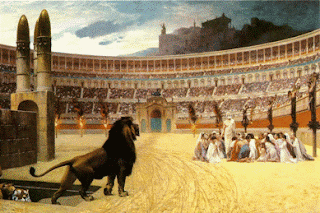Matthew: Have you blogged about Paul's post-conversion years in Tarsus? I'm wondering if the Jerusalem leaders conveniently put this nuisance (that's too strong of a word, I know) away for his Gentile friendly message.
Bill: Sorry, long day. Great question. I've looked at Damascus and Nabatea/Arabia several times, but never spent much time on that brief return to Jerusalem. Although Luke plays it straight on the 'for-your-own-safety' angle, it's fair to imagine Peter et al might have taken his leaving as a mixed blessing, at least.
OTOH, to that point in Acts we don't have anything on Paul and circumcision. In fact, by putting Paul with the Hellenists, whom Stephen also disputed with, Luke is telling us that Paul was specifically arguing/fellowshipping with circumcised Greek converts. So while it's very possible Peter & Co thought Paul's continued presence was dangerous for more than one reason, I don't yet see whether Paul has any vision about uncircumcision and the HS. Fascinating question. I'm actually ashamed to say I've never gone into this yet. (Thank You!)
Chronologically, the whole Peter/Joppa/Cornelius foray has always seemed like a semi-timeless piece within Acts, to me. To be more precise, since Galatians tells us that Acts 9:1-22 covers about three years (give or take), it didn't seem necessary to me that the next episode in Luke's narrative would be chronologically *after* that three year gap period. In other words, I once (long ago) decided to treat 9:32 as a possible flashback. Then, after a while, I just quit thinking about it. Then, much later, I started working on Peter & Cornelius (as I've posted on recently).
Thanks to your question, however, I suddenly realize that 9:28-30 does seem to fit better into Peter's "pre-enlightened" phase. The key question, however, is this: WHEN did Paul have his moment like Peter had in Cornelius' house? I never tried to pinpoint that before now. (Again, THANKS!)
First, I don't think Paul overcame circumcision right there on the Damascus Road. Jesus' words were that Paul would go to the gentiles. By themselves, those words are little different than what Peter thought while crossing over Cornelius' threshold. By themselves, those words don't explicitly make the knife a moot issue.
Second, I do think Antioch overcame circumcision at least three years before Peter did. Luke's placement of the Antioch story at 11:19 - which absolutely IS a flashback, to the scattering - by waiting until after the Caesarea episode this is Luke's way of implying more about the Antioch conversions (that, plus the implied contrast of 15:1).
Thus, it appears Paul's most likely moment of dawning was either upon meeting Antioch OR possibly at Tarsus, beforehand.
But to the basic part of your question again, I do think Paul may have been a nuisance in Jerusalem (and that's definitely NOT too strong for Paul, in any age or location - this is the same guy who was locked up or chased out of almost every town he ever went to) but Paul was NOT apparently a nuisance at this point for the sake of the HS and *uncircumcised* gentiles. In that brief era (early 37 AD, I'm certain) during which Peter & Paul actually ministered in the same civic space, I think Paul was enough trouble just as Stephen had been.
Overall, it is interesting how Luke allows Paul to appear as if he'd been enlightened right from the start... and yet Luke never says such a thing. In the hour or so that it took me to build this long comment-response, it's become clear to me that Paul had no such revelation in Damascus, in Arabia, or in Jerusalem. Maybe that's yet another reason why Acts remains sparse on the details of Paul's movements during that time. Again, fascinating!
Again, THANK YOU!
Matthew: Wow...thanks for the response! I'll read over this for a while and try to digest it all. :-)
Oh, and don't thank me. W.H.C. Frend's "The Rise of Christianity" gave me the idea. Thanks for interacting!
Hope that all made sense. I'll write a real post on all that someday, maybe.
Feel free to 'like' this post with an IRL thumbs up, and then "Leave a comment..." or "Share".


